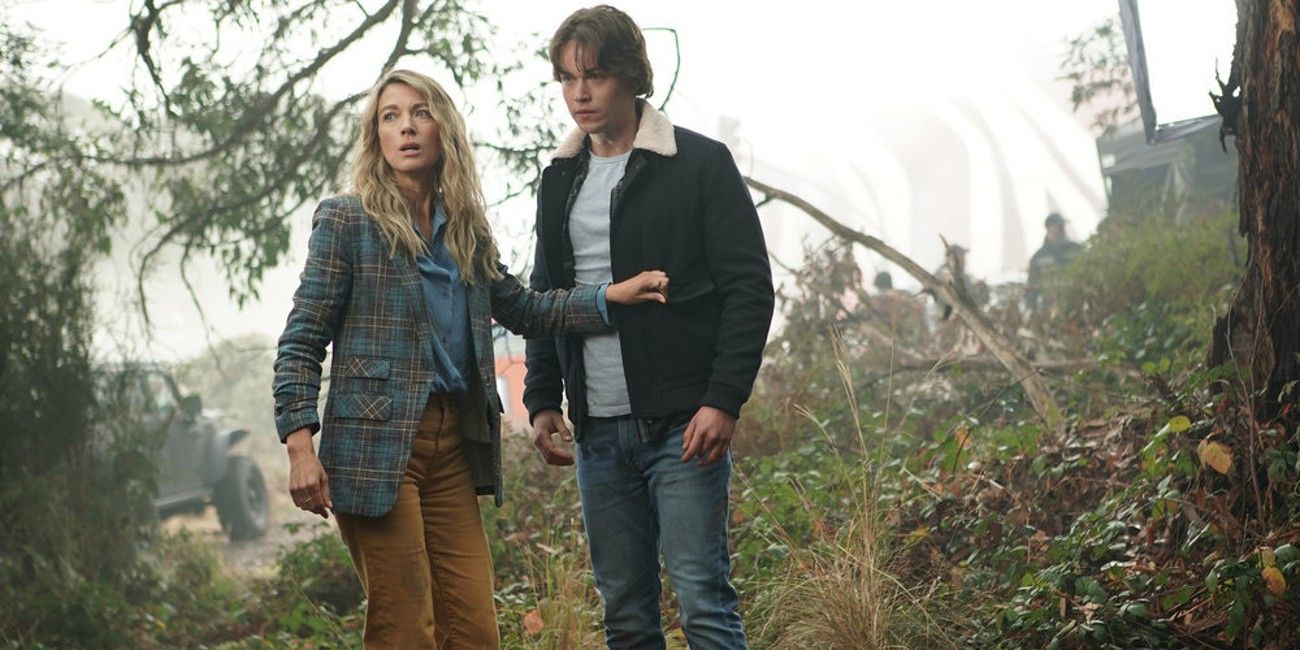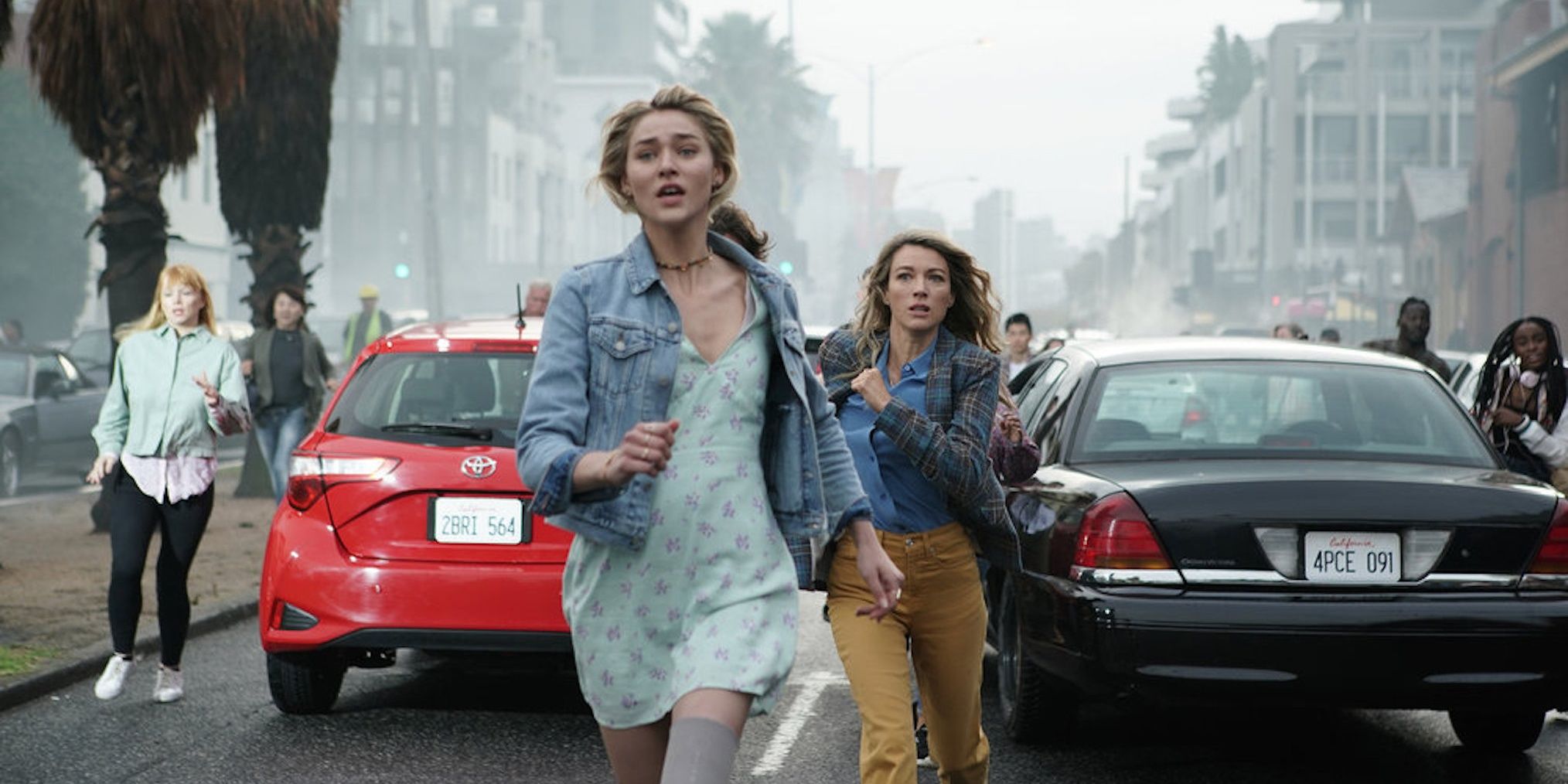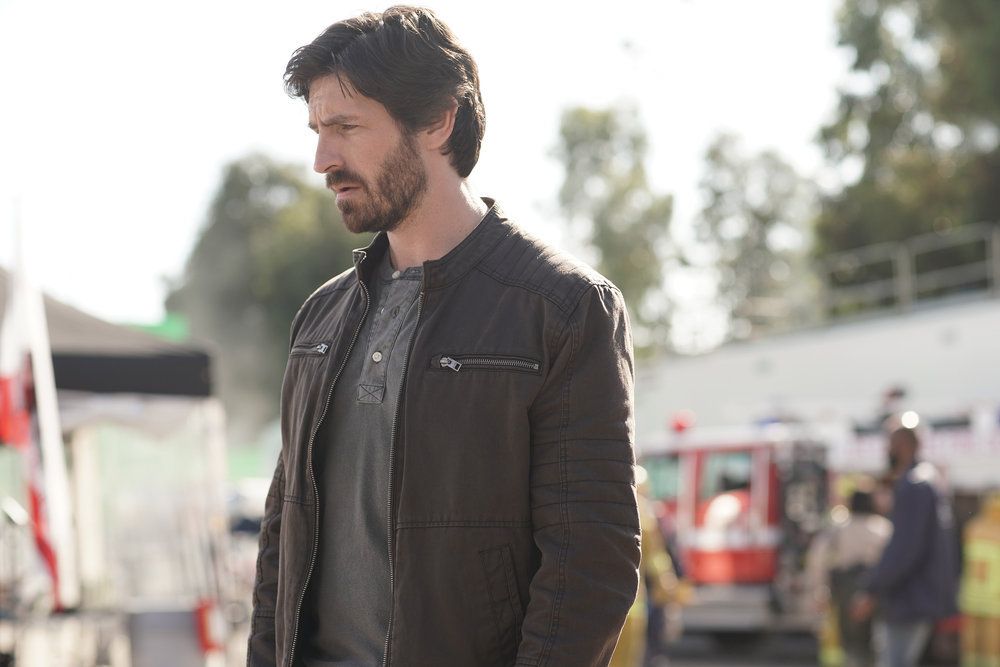
NBC's La Brea is one of the network's biggest television premieres this year. Created by David Appelbaum, La Brea follows an unassuming family living in Los Angeles who are sucked into a massive sinkhole. Suddenly, the family is transported to a strange world while those that remain on the surface learn there is much more to the cataclysmic event than meets the eye. Joining Appelbaum as executive producers are veteran showrunners Steven Lilien and Bryan Wynbrandt. The trio craft a harrowing tale of survival in a fantastical, sci-fi world.
In an exclusive interview with CBR, the creative team delved into the origins of La Brea, teased the show's time-bending stakes, and explained how they brought the ambitious production to life.

Do you remember the origins for this production and how the idea for La Brea came about?
David Appelbaum: Yes, it really just started out with an image of a sinkhole. It was an image that I just couldn't shake and hadn't seen depicted in television or film before. I started to construct a story around it: a sinkhole opens in Los Angeles but who falls in and where do they go? How are the people that are with them and what are the conflicts that arise? By doing that and asking all these questions, you start to create a world and, before you know it, there's a TV show. But it really was just the spark of the image from that sinkhole and from there, we went through the painstaking process of creating a TV show.
That image kicks off the whole show, we're just introduced to our characters before everything goes off the rails. How was it staging that level of action?
Bryan Wynbrandt: I think the big thing was that that was a really unique approach to the story because a lot of [times] generally you see the family at home and get in the car but, no, we're thrusting you right into this world. It's a touchstone for the philosophy of the storytelling for the show. We don't hold the audience's hands. We're thrusting you into these moments and you're going to be on the edge of the seat with the characters. What happens as a result of that is you get to meet them and have an opinion of them, at first, but what's fun about the show is we get to turn over cards that subvert expectations of what you thought.
A great example of that is Marybeth in the pilot, she's the character who takes the protein bars so she comes off as someone who's not trustworthy or out for themselves but then you start to turn over cards about who she really is and you start to feel so differently about her. It starts from the get-go with this show, you're thrust right into this story and we never take our foot off the gas.
You've got the characters and story of the people that fall into this world out of time but you've also got the characters still on the surface and this more dramatic story. How is it balancing those two narratives and sensibilities?
Steven Lilien: I think any time you bring the spectacle, like this wolf attack or coming into this world, you need to balance that with what's the fallout or what results from that. You never do something to just do it and the pilot is very specific that Josh gets bitten by this wolf and then the stakes become of a mother trying to save her son -- how far she'll go and what choices she's going to have to make along the way. All the choices we make as get into the series are all predicated on character and how they will respond and starting to see that instinct. It's fight-or-flight and how people are going to react. Maybe as they react one way, they discover something new about themselves. I think the balance always comes from character and that's how we approach it.
Wynbrandt: The tone of the up-top world, we wanted it to feel different. Down below is the survival story but up-top is a government conspiracy -- a what are they hiding, thriller story. Marrying those two things was nice too because it felt like it played in the same genre space so the tone felt like they complimented each other but also gave you an opportunity to take a breath. You can come up top and it provides a different context to what's happening down below so you get information that the people down below don't necessarily have right away. There's a fun kind of experience in that in getting to see a whole world from both sides.
This is one of the biggest productions in Australia and one of the biggest television productions during the pandemic. Did that inform the production, in regards to how many people you could have in shots or other considerations?
Appelbaum: We're always very aware of the COVID situation and the production took great pains to follow all the protocols and make sure everyone was safe. That was really a top priority for them. That being said, we were able to pull off big scenes, this show has lots of scope and scale and I think the pilot kind of promises that and we continue to deliver that episode-by-episode as well as continue the emotional stories for these characters. It's amazing what our team in Australia was able to pull off with this production, we're just always in awe of them and how much they're able to accomplish.

As much as I love Jules Verne, this isn't Journey to the Center of the Earth, there are a lot more action-adventure sensibilities. What were some of your big inspirations with this show?
Appelbaum: Spielberg movies were a big touchstone. So many Spielberg movies, what audiences love about them, is the scope, scale, and adventure but they all have this emotional heart to them. There's always that beating, emotional heart, like E.T. with the broken family. It's that sensibility that was the biggest driving inspiration but also Lord of Flies-type stories about survival. I watched a lot of Naked and Afraid, stories about how do you survive in the wilderness, things like that I find really fascinating.
Wynbrandt: There's a show called Dark that's a German time-travel show, during the pandemic I binged that when we were working on this. When you're talking about time-travel, where did they go back, we don't know but how do these two stories talk to each other? We wanted to take a modicum of modern sensibility to the storytelling and, as they said, it's hard not to be influenced by the genre having such a wealth of things to watch now but we tried to carve out our own space and I think we have.
When you're dealing with something like time-travel as a central plot mechanic, how do you create and maintain the rules when you're working in the writers' room?
Lilien: We try to keep it simple. If we can't understand it, the audience can't understand it. That really has to be the guiding principle and the simplicity in trying not to create too many rules. This event happened and the characters are separated and focusing more on the character stories and less on the mechanics -- of this light in the sky and how it connects to the world? Or how moving a stone in one world is going to affect the other? I think it's easy to get lost in that. I think our focus was more on the characters and driving the story forward and the mysteries of the world down below and the world up top too and not being afraid to turn over our cards, give our audience answers, and have a lot more questions to be answered and we're going to attack that.
And of course, there's the cast and you've assembled a global cast to bring this family to life. How is it working with and seeing these actors bring this show, story, and characters to life?
Appelbaum: It's amazing! We have thirteen series regulars and they all have their unique personalities and points of view from a diverse cross-section of the world. People from Australia, England, Ireland, the United States, it's really spread out but they've all really dug into their stories and characters in great ways. It's just been such a fun process to see the characters evolve and how they've interpreted them, it's one of the biggest joys of making a show.
How is it balancing an ensemble cast of thirteen and making sure everyone gets their just due, with developed backstories and changing relationships?
Wynbrandt: You want to find the balance and give everybody their time because it is an incredibly strong group and they're all so compelling in their own way. In the writers' room, we'll definitely say something like this episode is more Jon Seda-focused or this episode is more on Karina Logue or Chiké Okonkwo. Obviously, our core family is always central but finding those ways to bring these other characters out, we want the audience to come back for more than the family's story. We want them to be coming back for all the characters. I think we did a good job of that and we had a great open line of communication with our actors, we spoke with all of them -- not telling them where we were going to go because we wanted them to be surprised -- but in the instance of those specific episodes. I think it turned out really great and everybody gets their story.
With this show years in the making and finally done and ready to share with the world, what are you most excited about getting to put out La Brea?
Lilien: For me, it's seeing what people respond to, what characters or storylines they spark to. I know we all have our favorites and so it'll be interesting to see how people respond and if they respond differently. I'm excited to really see the reaction at the end of every episode and see their excitement. We're excited about where we're going and feel really strongly about each episode delivering new and exciting things with our characters. At this point, you've been living with it so long you're just ready to let it air and get a reaction moving along.
Appelbaum: It's funny having something in your head and working with your collaborators for two years. It's really surreal just to know it's going to be out there in the world and you hope that people are going to respond in the way that you expect them to. It's just really exciting just to know that we've got such support from NBC and Universal Television out there for a broad audience and to see what people's reactions are, it's really just an amazing time.
Created by David Appelbaum, La Brea airs Tuesdays at 9:00 pm ET/PT on NBC.
0 Comments